成语故事英语版
成语故事大全英文版
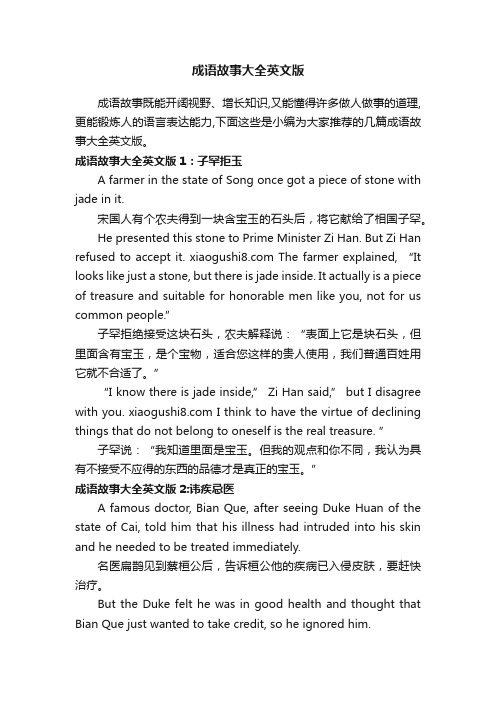
成语故事大全英文版成语故事既能开阔视野、增长知识,又能懂得许多做人做事的道理,更能锻炼人的语言表达能力,下面这些是小编为大家推荐的几篇成语故事大全英文版。
成语故事大全英文版1:子罕拒玉A farmer in the state of Song once got a piece of stone with jade in it.宋国人有个农夫得到一块含宝玉的石头后,将它献给了相国子罕。
He presented this stone to Prime Minister Zi Han. But Zi Han refused to accept it. The farmer explained, “It looks like just a stone, but there is jade inside. It actually is a piece of treasure and suitable for honorable men like you, not for us common people.”子罕拒绝接受这块石头,农夫解释说:“表面上它是块石头,但里面含有宝玉,是个宝物,适合您这样的贵人使用,我们普通百姓用它就不合适了。
”“I know there is jade inside,” Zi Han said,” but I disagree with you. I think to have the virtue of declining things that do not belong to oneself is the real treasure. ”子罕说:“我知道里面是宝玉。
但我的观点和你不同,我认为具有不接受不应得的东西的品德才是真正的宝玉。
”成语故事大全英文版2:讳疾忌医A famous doctor, Bian Que, after seeing Duke Huan of the state of Cai, told him that his illness had intruded into his skin and he needed to be treated immediately.名医扁鹊见到蔡桓公后,告诉桓公他的疾病已入侵皮肤,要赶快治疗。
简单的英语成语小故事5篇
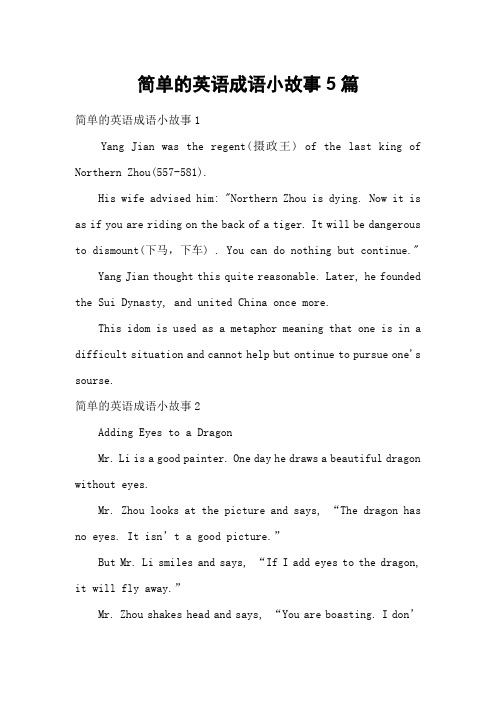
简单的英语成语小故事5篇简单的英语成语小故事1Yang Jian was the regent(摄政王) of the last king of Northern Zhou(557-581).His wife advised him: "Northern Zhou is dying. Now it is as if you are riding on the back of a tiger. It will be dangerous to dismount(下马,下车) . You can do nothing but continue."Yang Jian thought this quite reasonable. Later, he founded the Sui Dynasty, and united China once more.This idom is used as a metaphor meaning that one is in a difficult situation and cannot help but ontinue to pursue one's sourse.简单的英语成语小故事2Adding Eyes to a DragonMr. Li is a good painter. One day he draws a beautiful dragon without eyes.Mr. Zhou looks at the picture and says, “The dragon has no eyes. It isn’t a good picture.”But Mr. Li smiles and says, “If I add eyes to the dragon, it will fly away.”Mr. Zhou shakes head and says, “You are boasting. I don’t believe you.”Mr. Li isn’t angry. He holds the paintbrush and adds eyes to the dragon. Woe! The dragon really flies.画龙点睛李先生是位很好的画家。
英文版中国成语故事
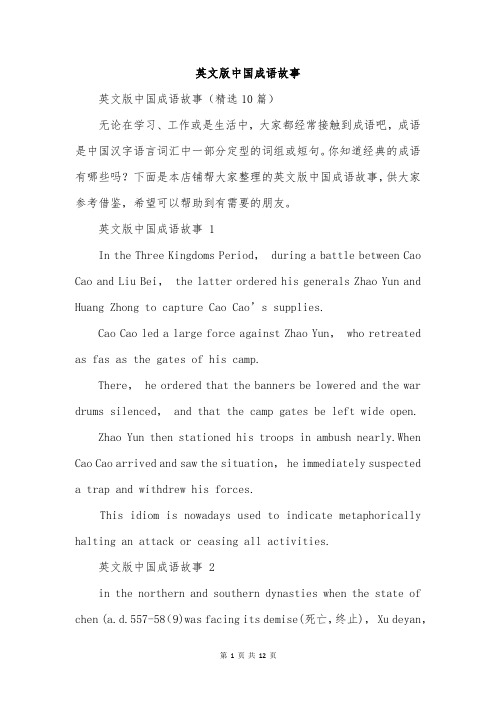
英文版中国成语故事英文版中国成语故事(精选10篇)无论在学习、工作或是生活中,大家都经常接触到成语吧,成语是中国汉字语言词汇中一部分定型的词组或短句。
你知道经典的成语有哪些吗?下面是本店铺帮大家整理的英文版中国成语故事,供大家参考借鉴,希望可以帮助到有需要的朋友。
英文版中国成语故事 1In the Three Kingdoms Period, during a battle between Cao Cao and Liu Bei, the latter ordered his generals Zhao Yun and Huang Zhong to capture Cao Cao’s supplies.Cao Cao led a large force against Zhao Yun, who retreated as fas as the gates of his camp.There, he ordered that the banners be lowered and the war drums silenced, and that the camp gates be left wide open.Zhao Yun then stationed his troops in ambush nearly.When Cao Cao arrived and saw the situation, he immediately suspected a trap and withdrew his forces.This idiom is nowadays used to indicate metaphorically halting an attack or ceasing all activities.英文版中国成语故事 2in the northern and southern dynasties when the state of chen (a.d.557-58(9)was facing its demise(死亡,终止), Xu deyan,husband of the princess, broke a bronze mirror into halves.each of them kept a half as tokens in case they were separated.soon afterwards, they did lose touch with each other,but the two halves of the mirror enabled them to be reunited.this idiom is used to refer to the reunion of a couple after they lose touch or break up.英文版中国成语故事 3during the warring states period (475-221bc), the king of the state of qi was very fond of listening to yu ensembles.he often got together 300 yu players to form a grand music.the king treated his musician very well.a man named nanguo heard about that and he managed to become a member of the band,even though he wan not good at playing the instrument at all.whenever the band played for the king, nanguo just stood in the line and pretended to play.nobody realized he was making no sound at all.as a result, he enjoyed his treatment just as the other musician did.when the king died, his son became the new ruler who also liked the music played on the yu.however,he preferred solos so that he ordered the musicians to play the yu one by one.therefore, nanguo had to run out of the palace.英文版中国成语故事 4At the end of the Qin Dynasty(221-206 B.C.)the State of Chu and the State of Han fought for control for the country.Xiang Yu, the king of Chu, was besieged(包围) at a place called GaiXia by the Han army led by Liu Bang.Xiang Yu was in a desperate situation,with little food and only a few soliders.At night, the surrounding Han troops started to sing Chu folk songs.Xiang Yu was very surprised at this,and said:"Has Liu Bang occupied the whole of Chu? How can he have drafted so many Chu people into his army?" Then he fled together with the remainder of his forces.This idiom is used metaphorically to mean to be in a helpless and critical situation, surrounded by the enemy on all sides.项羽和刘邦原来约定以鸿沟(在今河南荣县境贾鲁河)东西边作为界限,互不侵犯。
英文成语故事简短5句话
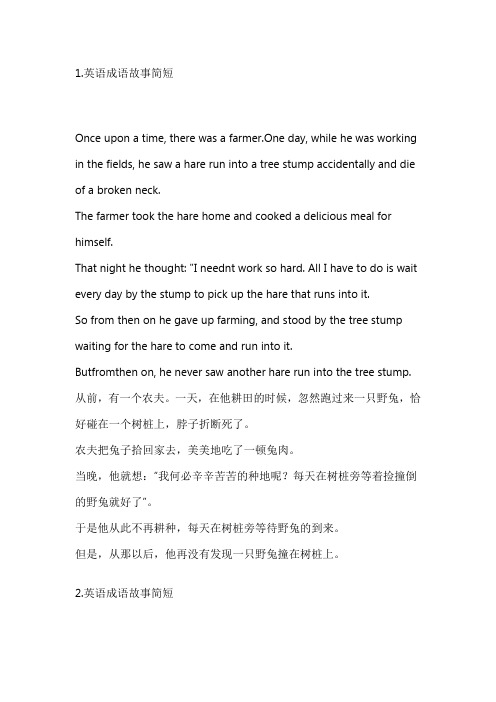
1.英语成语故事简短Once upon a time, there was a farmer.One day, while he was working in the fields, he saw a hare run into a tree stump accidentally and die of a broken neck.The farmer took the hare home and cooked a delicious meal for himself.That night he thought: "I neednt work so hard. All I have to do is wait every day by the stump to pick up the hare that runs into it.So from then on he gave up farming, and stood by the tree stump waiting for the hare to come and run into it.Butfromthen on, he never saw another hare run into the tree stump. 从前,有一个农夫。
一天,在他耕田的时候,忽然跑过来一只野兔,恰好碰在一个树桩上,脖子折断死了。
农夫把兔子拾回家去,美美地吃了一顿兔肉。
当晚,他就想:“我何必辛辛苦苦的种地呢?每天在树桩旁等着捡撞倒的野兔就好了”。
于是他从此不再耕种,每天在树桩旁等待野兔的到来。
但是,从那以后,他再没有发现一只野兔撞在树桩上。
2.英语成语故事简短In the reign of Emperor the Second of the Qin Dynasty (221-207 B.C.), the prime minister Zhao Gao, obsessed with ambitions, was planning to usurp the throne day and night. But he did not know how many of the ministers in the court were allowed to be ordered about by him and how many of them were his opponents. So he thought out a way to test how high his prestige among the ministers was and also to find out who dared to oppose him.One day when court was held, Zhao Gao let someone bring a stag to the court and, with a broad smile on his face, he said to Emperor the Second of the Qin Dynasty:"Your Majesty, here is a fine horse Im presenting to you." Looking at the animal, Emperor the Second thought that it was obviously a stag and that it couldnt be a horse. So he said smilingly to Zhao Gao:"Mister Prime Minister, you are wrong. This is a stay. Why do you say it is a horse?" Remaining calm, Zhao Gao said:"Will your Majesty please see more clearly? This really is a horse that covers a thousand li a day." Filled with suspicion, Emperor the Second looked at the stag again and said:"How can the antlers be grown on the head of a horse?" Turning around and pointing his finger at the ministers, Zhao Gao said in a loud voice:"if our Majesty do not believe me, you can ask the ministers."The nonsense of Zhao Gao made the ministers totally at a lose, and they whispered to themselves: What tricks was Zhao Gao playing? Was it not obvious whether it was a stag or a horse? But when they saw the sinister smile on Zhao Gaos face and his two rolling eyes which were gazing at each of them, they suddenly understood his evil intentions.Some of the ministers who were timid and yet had a sense of right eousness did not dare to say anything, because to tell lies would make their conscience uneasy and to tell the truth would mean that they would be persecuted by Zhao Gao later. Some ministers with a sense of justice persisted that it was a stag and not a horse. There were still some crafty and fawning ministers who followed Zhao Gao closely in ordinary times. They immediately voiced their support to Zhao Gao, saying to the emperor:"This really in a horse that covers a thousand li a day."After the event, Zhao Gao punished by various means those ministers with a sense of justice who were not obedient to him, even with whole families of some of those ministers executed.This story appears in "The Life of the First Emperor of the Qin Dynasty" in The Historical Records written by Sima Qian. From this story people have derived the set phrase "calling a stag a horse" to mean deliberately misrepresenting some thing and misleading the public.秦二世时,丞相赵高野心勃勃,日夜盘算着要篡夺皇位。
英语成语故事精选(5篇)

【导语】成语故事包涵着我国从古代到现在的⼤道理⼤智慧,通过描写⽣活的⼀些简单的事,让我们感觉到有趣从⽽明⽩需要知道的,成语故事是我国历史的⼀部分,成语是历史的积淀,每⼀个成语的背后都有⼀个含义深远的故事,是我国⼏千年以来⼈民智慧的结晶。
下⾯是⽆忧考整理分享的英语成语故事,欢迎阅读与借鉴,希望能够为⼤家带来帮助,同时也希望给你们带来⼀些参考的作⽤,如果喜欢就请继续关注⽆忧考的后续更新吧!1.英语成语故事:画饼充饥 This idiom comes from Records of Three Kingdoms Kingdom of Wei Biography of Lu Yu. When Lu Yu, the minister of the State of Wei was young, his parents and brothers all died one after another, and he became an orphan. In such a difficult situation, he still studied very hard. Finally he became a talented person and served as a high officialof hisstate.Hewassouprightin performing his official duties that he was promoted to the minister of the Board of Civil Office, in charge of the officials' appointments and removals. Owing to the vacancy of Lu Yu's original post, it had to fill up a new official for it. Although there were many officials to recommend some well-known people for the post, all were refused by Emperor Wen. He only let Lu Yu do it and also pointed out:"It depends on you whether we can find the right person for the important post. But we can't choose someone only with fame in stead of his real ability. You see, the fame is just like drawing cakes on the ground to allay hungry." Then Lu expressed his idea:" You are right, YourMajesty, selections should depend on their real learning and abilities. But the real fame is still very important, such as self-possession and high moral character. So we should select people with both of them." Now we use it to describe comforting oneself with unrealistic thoughts, without solving practical problemsand feeding on illusions.2.英语成语故事:黔驴技穷 In ancient times there were no donkeys in Guizhou province. Somebody brought a donkey from somewhere and tied it to a tree at the foot of a mountain. A tiger saw the donkey, and thought that it must be a fearsome(可怕的) monster. It hide behind a tree and spied on the donkey. When the donkey brayed(叫) , the tiger was frightened, thinking that the donkey was about to devour(吞⾷,毁灭) it. After a while, seeing that the donkey had not moved, the tiger approached it and teased it. The donkey became angry, and kicked the tiger. The tiger thought to itself: "Its then all it is capable of?" It then jumped on the donkey and ate it. This idiom is used to mean that one has exhauseted one's skills.3.英语成语故事:骑虎难下 Yan Jian was the regent(摄政王) of the last king of Northern Zhou(557-581). His wife advised him: "Northern Zhou is dying. Now it is as if you are riding on the back of a tiger. It will be dangerous to dismount(下马,下车) . You can do nothing but continue." Yan Jian thought this quite reasonable. Later, he founded the Sui Dynasty, and united China once more. This idom is used as a metaphor meaning that one is in a difficult situation and cannot help but ontinue to pursue one's sourse.4.英语成语故事:破釜沉⾈ during the late years of the qi dynasty(221-206bc), xiang yu led a rebellion. after crossing the zhang river, xiang yu ordered his men to sink all their boats and break their cooking pots. he issued each soldier three days' rations(给养) and warned them that there was no way to retreat; the only thing they could do to survive was to advance and fight. after mine fierce battles, the qin army was finally defeated. this idiom is used to indicate one's firm determination to achieve one's goal at any cost.5.英语成语故事:名落孙⼭ In the Song Dynasty(960-1279) there was a joker called Sun Shan. One year he went to take the imperial examination, and came bottom of the list of successful candidates. Back in his hometown, one of his neighbours asked him whether the neighbour's son had also passed. Sun Shan said, with a smile: "Sun Shan was the last on the list, your son came after Sun Shan." Later, people used this idiom to indicate failing in an examination or competition.。
有趣的英语成语故事【10篇】
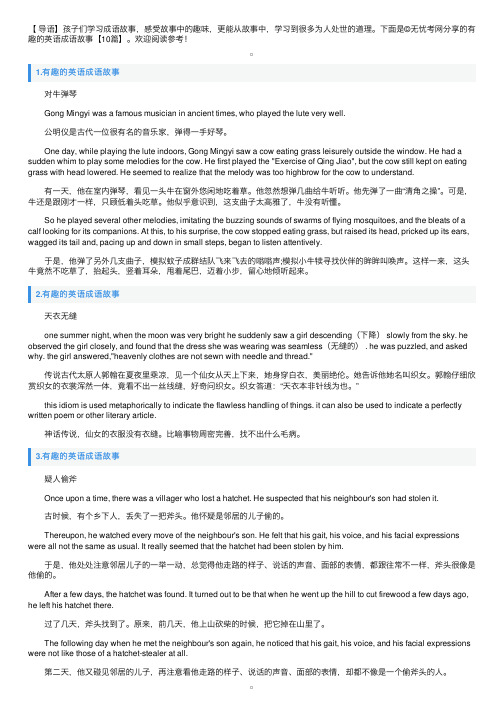
【导语】孩⼦们学习成语故事,感受故事中的趣味,更能从故事中,学习到很多为⼈处世的道理。
下⾯是©⽆忧考⽹分享的有趣的英语成语故事【10篇】。
欢迎阅读参考!1.有趣的英语成语故事 对⽜弹琴 Gong Mingyi was a famous musician in ancient times, who played the lute very well. 公明仪是古代⼀位很有名的⾳乐家,弹得⼀⼿好琴。
One day, while playing the lute indoors, Gong Mingyi saw a cow eating grass leisurely outside the window. He had a sudden whim to play some melodies for the cow. He first played the "Exercise of Qing Jiao", but the cow still kept on eating grass with head lowered. He seemed to realize that the melody was too highbrow for the cow to understand. 有⼀天,他在室内弹琴,看见⼀头⽜在窗外悠闲地吃着草。
他忽然想弹⼏曲给⽜听听。
他先弹了⼀曲“清⾓之操”。
可是,⽜还是跟刚才⼀样,只顾低着头吃草。
他似乎意识到,这⽀曲⼦太⾼雅了,⽜没有听懂。
So he played several other melodies, imitating the buzzing sounds of swarms of flying mosquitoes, and the bleats of a calf looking for its companions. At this, to his surprise, the cow stopped eating grass, but raised its head, pricked up its ears, wagged its tail and, pacing up and down in small steps, began to listen attentively. 于是,他弹了另外⼏⽀曲⼦,模拟蚊⼦成群结队飞来飞去的嗡嗡声;模拟⼩⽜犊寻找伙伴的眸眸叫唤声。
英语成语故事精选及翻译五篇
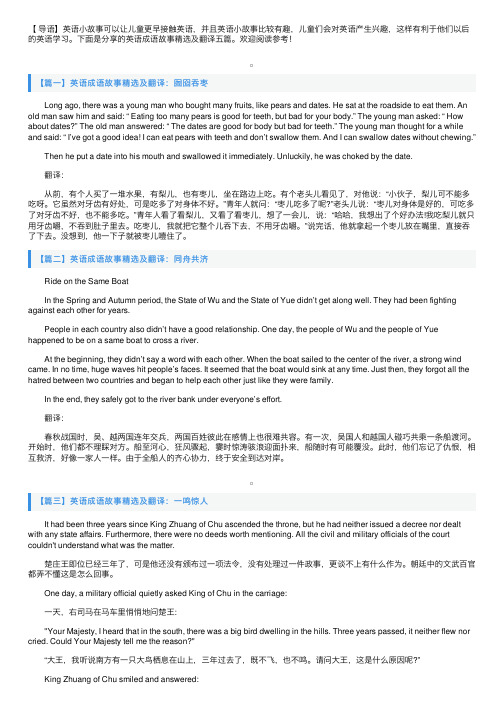
【导语】英语⼩故事可以让⼉童更早接触英语,并且英语⼩故事⽐较有趣,⼉童们会对英语产⽣兴趣,这样有利于他们以后的英语学习。
下⾯是分享的英语成语故事精选及翻译五篇。
欢迎阅读参考!【篇⼀】英语成语故事精选及翻译:囫囵吞枣 Long ago, there was a young man who bought many fruits, like pears and dates. He sat at the roadside to eat them. An old man saw him and said: “ Eating too many pears is good for teeth, but bad for your body.” The young man asked: “ How about dates?” The old man answered: “ The dates are good for body but bad for teeth.” The young man thought for a while and said: “ I’ve got a good idea! I can eat pears with teeth and don’t swallow them. And I can swallow dates without chewing.” Then he put a date into his mouth and swallowed it immediately. Unluckily, he was choked by the date. 翻译: 从前,有个⼈买了⼀堆⽔果,有梨⼉,也有枣⼉,坐在路边上吃。
有个⽼头⼉看见了,对他说:“⼩伙⼦,梨⼉可不能多吃呀。
它虽然对⽛齿有好处,可是吃多了对⾝体不好。
”青年⼈就问:“枣⼉吃多了呢?”⽼头⼉说:“枣⼉对⾝体是好的,可吃多了对⽛齿不好,也不能多吃。
经典成语故事英文版简短【五篇】

【导语】成语是历史的积淀,每⼀个成语的背后都有⼀个含义深远的故事。
下⾯是⽆忧考分享的经典成语故事英⽂版简短【五篇】。
欢迎阅读参考!【篇⼀】经典成语故事英⽂版简短 The Mantis Tries to Stop the Chariot蛙臂挡车 One day, Zhuang Gong, King of the State of Qi, went out in a chariot to hunt. ⼀天,齐庄公乘车外出打猎。
On the way, he saw a small insect raise both its arms, trying to stop the wheels of the chariot. Zhuang Gong of Qi was curious and asked the driver: 路上,他看见⼀只⼩⾍举起双臂,想阻挡车轮前进。
齐庄公很好奇,就问车夫: "What kind of insect is it?" “这是什么⾍⼦?” "It is a mantis," the driver replied promptly. "This kind of insect only knows how to advance but not retreat, blindly underrating its enemies and overrating its own abilities." 车夫连忙回答:“这是蝗螂。
这种⾍⼦只知前进,不知后退,盲⽬轻敌,不⾃量⼒。
” Hearing the driver's reply, Zhuang Gong smiled to himself and remained silent. 听了车夫的回答,庄公暗⾃发笑,默默⽆语。
【篇⼆】经典成语故事英⽂版简短 Yang Bu Beats the Dog杨布打狗 Yang Zhu had a younger brother named Yang Bu. 杨朱有个弟弟叫杨布。
简短的英语成语故事三篇
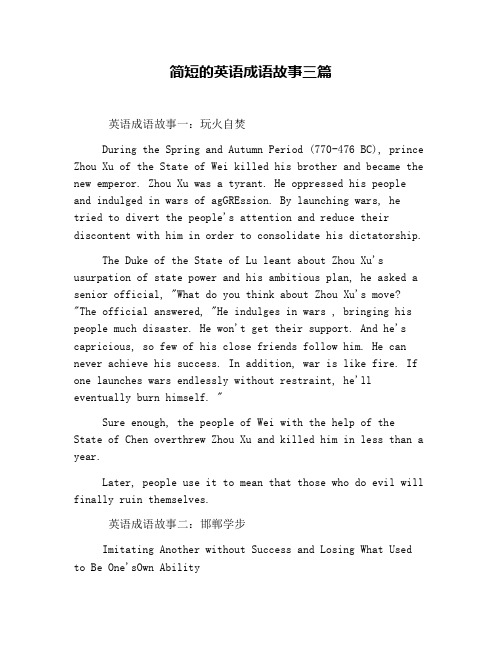
简短的英语成语故事三篇英语成语故事一:玩火自焚During the Spring and Autumn Period (770-476 BC), prince Zhou Xu of the State of Wei killed his brother and became the new emperor. Zhou Xu was a tyrant. He oppressed his people and indulged in wars of agGREssion. By launching wars, he tried to divert the people's attention and reduce their discontent with him in order to consolidate his dictatorship.The Duke of the State of Lu leant about Zhou Xu's usurpation of state power and his ambitious plan, he asked a senior official, "What do you think about Zhou Xu's move? "The official answered, "He indulges in wars , bringing his people much disaster. He won't get their support. And he's capricious, so few of his close friends follow him. He can never achieve his success. In addition, war is like fire. If one launches wars endlessly without restraint, he'll eventually burn himself. "Sure enough, the people of Wei with the help of the State of Chen overthrew Zhou Xu and killed him in less than a year.Later, people use it to mean that those who do evil will finally ruin themselves.英语成语故事二:邯郸学步Imitating Another without Success and Losing What Used to Be One'sOwn AbilityTradition has it that more than 2,oooyears ago,there lived a young man in the Shouling area of the State of Yan.As his name is not known ,we just call him Shouling young manfor convenience's sake.self confident He was at a loss as to how to behave all the time.His family members advised him to overcome this shortcoming,but he thought they were fond of poking their noses into his business and were unwilling to provide him with tuition fee.His relatives and neighbours sneered at him,saying that he would never be able to learnanything.Asthe days went by,he even began to doubt whether he should walk the way he did,for he felt more and more that his walking gestures were too clumsy and awkward.One day,he met some people on the road who werechattingand laughing.One of themsaid that people in Handan walked most gracefully.And thatwas just what he was most concerned about,so he hurreed towards themand wanted to make further inquiries.To his surprise,when these people saw him,they stalked off laughing.He could not picture to himself in what way their walking gestures were graceful,no matter how hard he racked his parents one day.He went to Handanwhich was far away to learn how to walk.As soon as he arrived in Handan,he was dazzled to find that everything was novel.He learned from the children there how to walk,because he thought that the children's walking gestures were lively and pleasing to the eye.He learnd fromthe old people there how to walk,because he thought the old people's walking gestures were steady .He learnd from the women there how to walk,because he thought the women' swaying walking gestures were beautiful.That being the case withhim ,in less than half a month he even forgot how to walk.As he had already used up his traveling expenses,he had to crawl back home.Thisstory come from the article"Autumn Water"in The Works of Xhuang Zi(Zhuang Zi was a famous ancient Chinese philosopher of about 300B.c.).Later the set phrase"initating another without success and losing what used to be one's own ability"is used to refer to acts of copying others mechanisally in disregard of specififc conditions.英语成语故事三:塞翁失马Near China's northern borders lived a man well versed in the practices of Taoism. His horse, for no reason at all, got into the territory of the northern tribes. Everyone commiserated with him."Perhaps this will soon turn out to be a blessing," said his father.After a few months, his animal came back, leading a fine horse from the north. Everyone congratulated him."Perhaps this will soon turn out to be a cause of misfortune," said his father.Since he was well-off and kept good horses his son became fond of riding and eventually broke his thigh bone falling from a horse. Everyone commiserated with him."Perhaps this will soon turn out to be a blessing," said his father.One year later, the northern tribes started a biginvasion of the border regions. All able-bodied young mentook up arms and fought against the invaders, and as a result, around the border nine out of ten men died. This man's sondid not join in the fighting because he was crippled and so both the boy and his father survived.。
简短的英语成语故事三篇
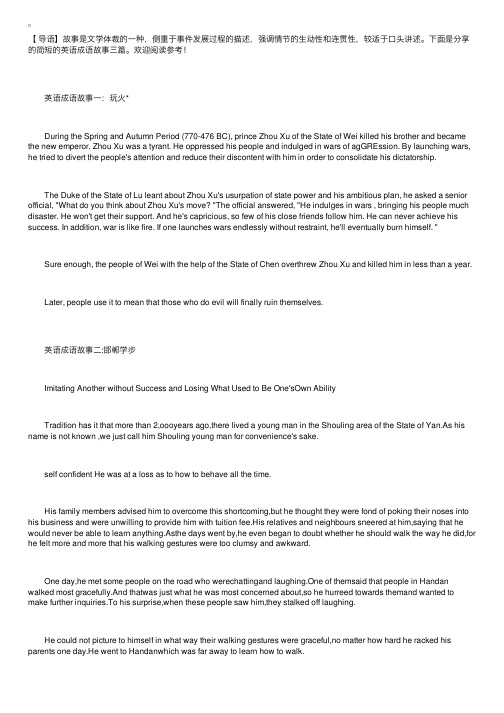
【导语】故事是⽂学体裁的⼀种,侧重于事件发展过程的描述,强调情节的⽣动性和连贯性,较适于⼝头讲述。
下⾯是分享的简短的英语成语故事三篇。
欢迎阅读参考! 英语成语故事⼀:玩⽕* During the Spring and Autumn Period (770-476 BC), prince Zhou Xu of the State of Wei killed his brother and became the new emperor. Zhou Xu was a tyrant. He oppressed his people and indulged in wars of agGREssion. By launching wars, he tried to divert the people's attention and reduce their discontent with him in order to consolidate his dictatorship. The Duke of the State of Lu leant about Zhou Xu's usurpation of state power and his ambitious plan, he asked a senior official, "What do you think about Zhou Xu's move? "The official answered, "He indulges in wars , bringing his people much disaster. He won't get their support. And he's capricious, so few of his close friends follow him. He can never achieve his success. In addition, war is like fire. If one launches wars endlessly without restraint, he'll eventually burn himself. " Sure enough, the people of Wei with the help of the State of Chen overthrew Zhou Xu and killed him in less than a year. Later, people use it to mean that those who do evil will finally ruin themselves. 英语成语故事⼆:邯郸学步 Imitating Another without Success and Losing What Used to Be One'sOwn Ability Tradition has it that more than 2,oooyears ago,there lived a young man in the Shouling area of the State of Yan.As his name is not known ,we just call him Shouling young man for convenience's sake. self confident He was at a loss as to how to behave all the time. His family members advised him to overcome this shortcoming,but he thought they were fond of poking their noses into his business and were unwilling to provide him with tuition fee.His relatives and neighbours sneered at him,saying that he would never be able to learn anything.Asthe days went by,he even began to doubt whether he should walk the way he did,for he felt more and more that his walking gestures were too clumsy and awkward. One day,he met some people on the road who werechattingand laughing.One of themsaid that people in Handan walked most gracefully.And thatwas just what he was most concerned about,so he hurreed towards themand wanted to make further inquiries.To his surprise,when these people saw him,they stalked off laughing. He could not picture to himself in what way their walking gestures were graceful,no matter how hard he racked his parents one day.He went to Handanwhich was far away to learn how to walk. As soon as he arrived in Handan,he was dazzled to find that everything was novel.He learned from the children there how to walk,because he thought that the children's walking gestures were lively and pleasing to the eye.He learnd from the old people there how to walk,because he thought the old people's walking gestures were steady .He learnd from the women there how to walk,because he thought the women' swaying walking gestures were beautiful.That being the case with him ,in less than half a month he even forgot how to walk.As he had already used up his traveling expenses,he had to crawl back home. Thisstory come from the article"Autumn Water"in The Works of Xhuang Zi(Zhuang Zi was a famous ancient Chinese philosopher of about 300B.c.).Later the set phrase"initating another without success and losing what used to be one's own ability"is used to refer to acts of copying others mechanisally in disregard of specififc conditions. 英语成语故事三:塞翁失马 Near China's northern borders lived a man well versed in the practices of Taoism. His horse, for no reason at all, got into the territory of the northern tribes. Everyone commiserated with him. "Perhaps this will soon turn out to be a blessing," said his father. After a few months, his animal came back, leading a fine horse from the north. Everyone congratulated him. "Perhaps this will soon turn out to be a cause of misfortune," said his father. Since he was well-off and kept good horses his son became fond of riding and eventually broke his thigh bone falling from a horse. Everyone commiserated with him. "Perhaps this will soon turn out to be a blessing," said his father. One year later, the northern tribes started a big invasion of the border regions. All able-bodied young men took up arms and fought against the invaders, and as a result, around the border nine out of ten men died. This man's son did not join in the fighting because he was crippled and so both the boy and his father survived.。
中英文成语故事精选三篇
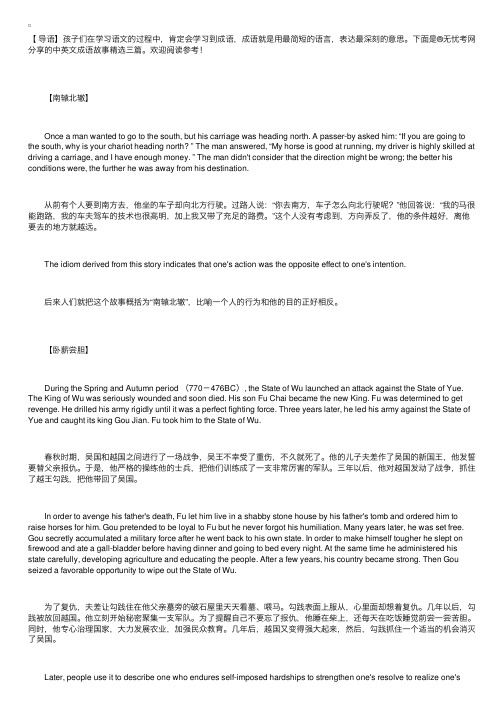
【导语】孩⼦们在学习语⽂的过程中,肯定会学习到成语,成语就是⽤最简短的语⾔,表达最深刻的意思。
下⾯是®⽆忧考⽹分享的中英⽂成语故事精选三篇。
欢迎阅读参考! 【南辕北辙】 Once a man wanted to go to the south, but his carriage was heading north. A passer-by asked him: “If you are going to the south, why is your chariot heading north? ” The man answered, “My horse is good at running, my driver is highly skilled at driving a carriage, and I have enough money. ” The man didn't consider that the direction might be wrong; the better his conditions were, the further he was away from his destination. 从前有个⼈要到南⽅去,他坐的车⼦却向北⽅⾏驶。
过路⼈说:“你去南⽅,车⼦怎么向北⾏驶呢?”他回答说:“我的马很能跑路,我的车夫驾车的技术也很⾼明,加上我⼜带了充⾜的路费。
”这个⼈没有考虑到,⽅向弄反了,他的条件越好,离他要去的地⽅就越远。
The idiom derived from this story indicates that one's action was the opposite effect to one's intention. 后来⼈们就把这个故事概括为“南辕北辙”,⽐喻⼀个⼈的⾏为和他的⽬的正好相反。
【卧薪尝胆】 During the Spring and Autumn period (770-476BC), the State of Wu launched an attack against the State of Yue. The King of Wu was seriously wounded and soon died. His son Fu Chai became the new King. Fu was determined to get revenge. He drilled his army rigidly until it was a perfect fighting force. Three years later, he led his army against the State of Yue and caught its king Gou Jian. Fu took him to the State of Wu. 春秋时期,吴国和越国之间进⾏了⼀场战争,吴王不幸受了重伤,不久就死了。
成语故事大全英文精选_成语故事大全
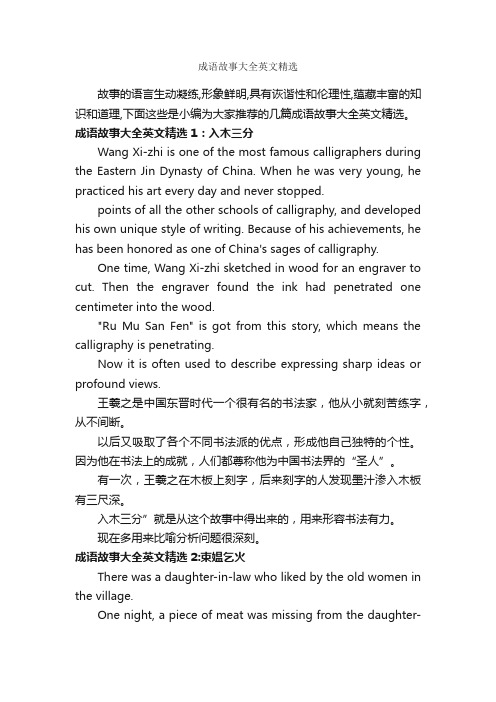
成语故事大全英文精选故事的语言生动凝练,形象鲜明,具有诙谐性和伦理性,蕴藏丰富的知识和道理,下面这些是小编为大家推荐的几篇成语故事大全英文精选。
成语故事大全英文精选1:入木三分Wang Xi-zhi is one of the most famous calligraphers during the Eastern Jin Dynasty of China. When he was very young, he practiced his art every day and never stopped.points of all the other schools of calligraphy, and developed his own unique style of writing. Because of his achievements, he has been honored as one of China's sages of calligraphy.One time, Wang Xi-zhi sketched in wood for an engraver to cut. Then the engraver found the ink had penetrated one centimeter into the wood."Ru Mu San Fen" is got from this story, which means the calligraphy is penetrating.Now it is often used to describe expressing sharp ideas or profound views.王羲之是中国东晋时代一个很有名的书法家,他从小就刻苦练字,从不间断。
以后又吸取了各个不同书法派的优点,形成他自己独特的个性。
因为他在书法上的成就,人们都尊称他为中国书法界的“圣人”。
精品英语成语故事20篇(英汉双语)

①凿壁偷光Chisal Wall to Steal LightKuang Heng was born in a poor family. He liked reading books very much. He needed to work at daytime, so he had to read books during night. But he was too poor to buy a candle.One day, he found his neighbour had candles, but the light couldn’t go through his room. So he dug a small hole on the wall so that he could use the light to read books. From that day, he read books every night until the light went out.However, he finished reading all his books and there were no books for him to read. Then he went to a rich man’s house and worked for him without payment. The rich man asked: “ Why don’t you want the money?” Kuang Heng said: “ Because I only want to borrow your books.” The rich man agreed. Kuang Heng read the books on e by one.Finally, he became a great scholar.匡衡勤奋好学,但家中没有蜡烛。
用英语讲述成语故事

用英语讲述成语故事
Introduction
成语是汉语中的一种特殊词语,是由若干个字组成的固定搭配,具有特定的意义。
这些成语在汉语中使用非常频繁,而且具有浓厚的文化背景。
许多成语都有寓意深远的故事背景,通过这些故事,我们可以更好地理解和记忆这些成语。
在本文中,我将用英语向你讲述一些著名的成语故事。
Story 1: 打草惊蛇(dǎ cǎo jīng shé)
Long ago, in a remote mountain village, there lived a group of hunters. One day, they discovered that there was a snake in the grass, so they decided to hunt it. They planned to wait until the snake had come out of the grass and then catch it. However, one of the hunters, in his impatience, decided to hit the grass with a stick to scare the snake. This unexpected action scared the snake away and ruined their chance of catching it.
From then on, people use the phrase。
英文成语故事附翻译

英文成语故事附翻译英文成语故事附翻译(通用13篇)故事是一种文学体裁,生动的,美妙的故事可以帮你认识社会、理解人生,引导你做一个通达事理、明辨是非的人。
下面是小编帮大家整理的英文成语故事附翻译,供大家参考借鉴,希望可以帮助到你。
英文成语故事附翻译篇1During the Spring and Autumn Period (770-476 BC), prince Zhou Xu of the State of Wei killed his brother and became the new emperor. Zhou Xu was a tyrant. He oppressed his people and indulged in wars of agGREssion. By launching wars, he tried to divert the peoples attention and reduce their discontent with him in order to consolidate his dictatorship.The Duke of the State of Lu leant about Zhou Xus usurpation of state power and his ambitious plan, he asked a senior official, "What do you think about Zhou Xus move? "The official answered, "He indulges in wars , bringing his people much disaster. He wont get their support. And hes capricious, so few of his close friends follow him. He can never achieve his success. In addition, war is like fire. If one launches wars endlessly without restraint, hell eventually burn himself. "Sure enough, the people of Wei with the help of the State of Chen overthrew Zhou Xu and killed him in less than a year.Later, people use it to mean that those who do evil will finally ruin themselves.春秋时期,卫国的王子州吁杀死了他的哥哥卫桓公,成为了卫国的国君。
中国成语故事英文版(集合8篇)
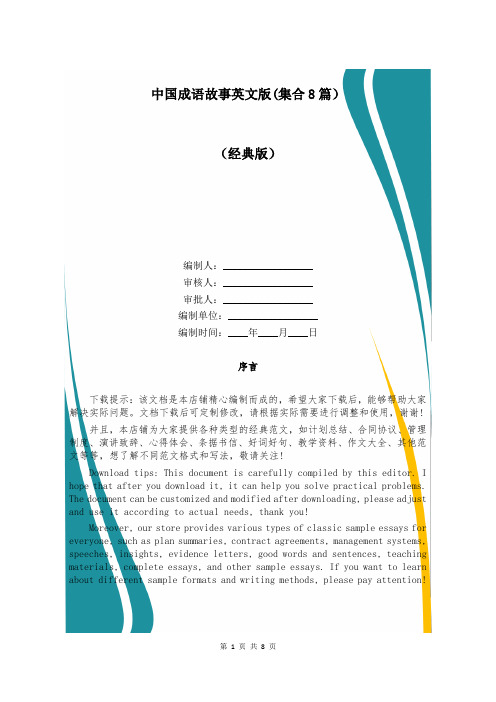
中国成语故事英文版(集合8篇)(经典版)编制人:__________________审核人:__________________审批人:__________________编制单位:__________________编制时间:____年____月____日序言下载提示:该文档是本店铺精心编制而成的,希望大家下载后,能够帮助大家解决实际问题。
文档下载后可定制修改,请根据实际需要进行调整和使用,谢谢!并且,本店铺为大家提供各种类型的经典范文,如计划总结、合同协议、管理制度、演讲致辞、心得体会、条据书信、好词好句、教学资料、作文大全、其他范文等等,想了解不同范文格式和写法,敬请关注!Download tips: This document is carefully compiled by this editor. I hope that after you download it, it can help you solve practical problems. The document can be customized and modified after downloading, please adjust and use it according to actual needs, thank you!Moreover, our store provides various types of classic sample essays for everyone, such as plan summaries, contract agreements, management systems, speeches, insights, evidence letters, good words and sentences, teaching materials, complete essays, and other sample essays. If you want to learn about different sample formats and writing methods, please pay attention!中国成语故事英文版(集合8篇)中国成语故事英文版(1)郑人买履A man of the state of Zheng wanted to buy a pair of He measured his foot and put the measurement on a When he set out for the market he forgot to bring it It was after he had found the pair he wanted that this occurred toI forgot the measurement,saidHe went home to get it but when he returned the market had broken up and he did not get his shoes afterWhy didnt you try on the shoes with your feet?He wasI d rather trust the measurement than trust中国成语故事英文版(2)买椟还珠A man from the state of Chu wanted to sell a precious pearl in the state of He made a casket(小箱,棺材)for the pearl out of the wood from a magnolia(木兰)tree,which he fumigated(熏制)with He studded the casket with pearls and jade,ornamented it with red gems and decorated it with kingfisher(翠鸟) A man of the state of Zheng bought the casket and gave him back theToo luXuriant(丰富的,奢华的)decoration usually supersedes(取代)what really This man from Chu certainly knew how to sell a casket but he was no good at selling his And the man of Zheng didnt know which is really中国成语故事英文版(3)万事俱备只欠东风China has been divided into three kingdoms historically: Wei in the north,Shu in the southwest and Wu in the once Cao Cao from Wei led a 200,000 strong army down to the south to wipe out the kingdoms of Wu and Therefore,Wu and Shu united to defend his Cao ordered his men to link up the boats by iron chains to form a bridge for the Caos passing from the north bank of Yangtze River to the south The General Commander of the allied army was Zhou He analyzed the situation Then he got a good He decided to attack the enemy with So he began to prepare for the neting Suddenly he thought of the direction of He needed the east wind to blow strongly in order to acnetplish his However,the wind did not nete for Thus Zhou Yu was worried about At that time,he got a note from Zhuge Liang,the military adviser of the State of Shu,which reads:"To fight Cao CaoFire will help you winEverything is readyEXcept the east wind"Quickly he turned to Zhuge Liang for Zhuge told him not to worry and there would be an east wind in a couple of Two days later,the east wind helped Zhou acnetplish his At last,the allied army won theLater,people use it to say "All is ready eXcept what is crucial".中国成语故事英文版(4)相敬如宾During the Spring and Autumn Period (770-476 BC),there was a high official in the State of He once saw a farmer working in the field and his wife bringing his lunch to him in a very respectful He showed great interest in the He took the farmer back to Jin with him,and said to the King of Jin,"Respect is a demonstration of If one is respectful,he must be We should educate our people with " But the King asked,"His father is guilty,is it wise to do so?" He replied,"Guan Zhong had been enemy to the Duke Huan of Qi,but the duke appointed Guan Zhong prime minister and finally acnetplished his Shun eXiled Gun but promoted his son You just make use of his strong " At last,Duke Wen took his advice and put the farmer in an important Later,this idiom means a couple treats each other with respect like中国成语故事英文版(5)入木三分Wang Xi-zhi is one of the most famous calligraphers(书法家)during the Eastern Jin Dynasty of When he was very young,he practiced his art every day and neverLater he absorbed the strong points of all the other schools of calligraphy,and developed his own unique style of Because of his achievements,he has been honored as one of Chinas sages of One time,Wang Xi-zhi sketched in wood for an engraver to Then the engraver found the ink had penetrated one centimeter into the"Ru Mu San Fen" is got from this story,which means the calligraphy isNow it is often used to describe eXpressing sharp ideas or profound中国成语故事英文版(6)一技之长Gong sun Long,is a famous scholar lived in the State of Zhao during the Warring States Period (475-221BC)He had kepta circle skilled people around He often said,"A wise man should welnete anyone with a "One day,a man dressed in tattered(破烂的)and dirty clothes came to see him and said to him:" I have a special "Gong asked: "What is it?""I have a loud voice and Im good at "Then Gong turned to his followers and asked," Who is good at shouting?" But none of them answered "Yes ".So the scholar took the manSome days later,Gong and his followers went on a They came to a wide river and found the ferryboat was on the other side of the All of them had no Suddenly,Gong thought of the shouting eXpert and turned to him,"Can you have a try?" The man realized it was the chance to show his He shouted to the ferryman as loud as he could,"Hey,ferryman,nete here,we want to cross the " As his voice ended,the ferryman came to fetch Gong was very satisfied with the newLater,people use it to describe anyone who has a special professional中国成语故事英文版(7)叶公好龙In the Spring and Autumn Period,there lived in Chu a personnamed Chu Zhuliang,who addressed himself as "Lord Ye".Its said that this Lord Ye was very fond of The walls had dragons painted on The beams,pillars,doors and the windows were all carved with As a result,his love for dragons was spread When the real dragon in heaven heard of this Lord Ye,he was deeply He decided to visit Lord Ye to thank You might think Lord Ye was very happy to see a real But,actually,at very the sight of the creature,he was scared out of his wits and ran away as fast as heFrom then on,people knew that Lord Ye only loved pictures or carvings which look like dragons,not the real 中国成语故事英文版(8)望梅止渴Among the outstanding figures of Chinese history,famous either for their intelligence or treachery(背叛,变节),Cao Cao is one of theOne hot day,he marched out his troops under a burning sun in a mountainous Bewilderingly(令人困惑地)he lost the The journey was long and the sun was After their fruitless and tiresome march,all voiced their great dissatisfaction with the leadership of Cao They bitterly complained of their great The antagonism(对抗)of the soldiers was growing fast and theywere on the verge of staging a mutiny(兵变)The subordinate officers were helpless to cope with theCao Cao,however,in the nick of time cleverly and treacherously gave orders to his troops to march to the nearby plum trees for a rest and announced that soldiers would be allowed to eat the juicy sour(酸的)fruit as much as they At the thought of the sour fruit the soldiers complaint of great thirst as well as the antagonistic feeling were quickly based on the story the later generation formed the proverb "to quench ones thirst by looking up at plums",to illustrate a case where one takes comfort in believing that they have already attained that which was eXpected or。
英文版的成语故事
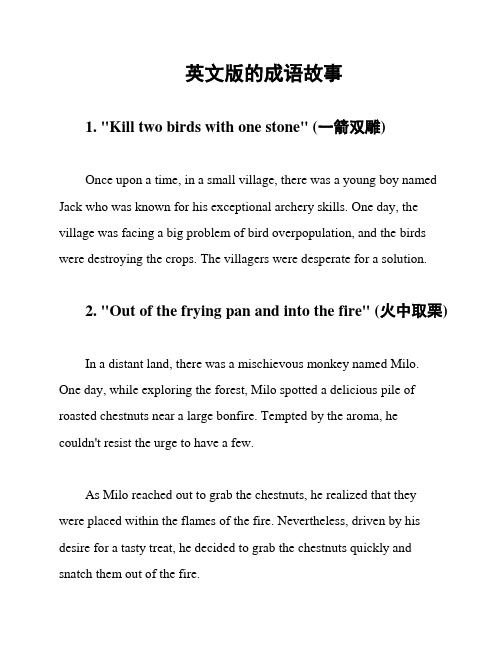
英文版的成语故事1. "Kill two birds with one stone" (一箭双雕)Once upon a time, in a small village, there was a young boy named Jack who was known for his exceptional archery skills. One day, the village was facing a big problem of bird overpopulation, and the birds were destroying the crops. The villagers were desperate for a solution.2. "Out of the frying pan and into the fire" (火中取栗)In a distant land, there was a mischievous monkey named Milo. One day, while exploring the forest, Milo spotted a delicious pile of roasted chestnuts near a large bonfire. Tempted by the aroma, he couldn't resist the urge to have a few.As Milo reached out to grab the chestnuts, he realized that they were placed within the flames of the fire. Nevertheless, driven by his desire for a tasty treat, he decided to grab the chestnuts quickly and snatch them out of the fire.Unfortunately, as Milo grabbed the chestnuts, he not only burned his hands but also dropped most of them into the fire. In his attempt to escape the heat of the flames, he ended up in an even worse situation.The phrase "out of the frying pan and into the fire" originated from this incident, representing a situation where someone tries to escape a problem but ends up in a more challenging or dangerous situation.3. "A blessing in disguise" (因祸得福)In a small village, a poor farmer named Peter owned a small piece of land. One day, a powerful storm struck the village, destroying houses and crops. Peter's house and land were severely damaged, leaving him devastated.Neighboring villagers sympathized with Peter's misfortune and came to help him rebuild his house and recover his land. During the reconstruction process, they discovered a hidden treasure buried deep under Peter's land.The unexpected discovery of the treasure brought immense wealth and prosperity to Peter. He realized that the storm, which initially seemed like a misfortune, turned out to be a blessing in disguise.4. "Catch someone red-handed" (当场抓住)In a bustling town, there was a notorious thief named Tom. The townspeople were tired of Tom's repeated thefts but struggled to catch him in the act. Determined to put an end to his criminal activities, the townspeople devised a plan.They set up a bait by placing valuable goods in a shop, knowing that Tom couldn't resist the temptation. As expected, one night, Tom broke into the shop, intending to steal the valuable items. Little did he know that the townspeople had been lying in wait.As Tom was about to grab the valuable goods, the townspeople burst into the shop, catching him "red-handed". Tom's shock and surprise were evident as the stolen goods slipped from his hands.结束以上是几个常见的英语成语故事,它们既有趣又有教育意义。
英语成语故事大全(5篇)
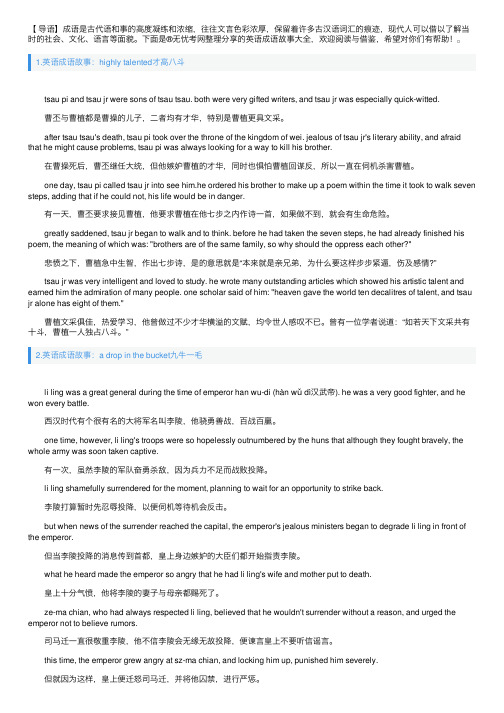
【导语】成语是古代语和事的⾼度凝练和浓缩,往往⽂⾔⾊彩浓厚,保留着许多古汉语词汇的痕迹,现代⼈可以借以了解当时的社会、⽂化、语⾔等⾯貌。
下⾯是®⽆忧考⽹整理分享的英语成语故事⼤全,欢迎阅读与借鉴,希望对你们有帮助!1.英语成语故事:highly talented才⾼⼋⽃tsau pi and tsau jr were sons of tsau tsau. both were very gifted writers, and tsau jr was especially quick-witted.曹丕与曹植都是曹操的⼉⼦,⼆者均有才华,特别是曹植更具⽂采。
after tsau tsau's death, tsau pi took over the throne of the kingdom of wei. jealous of tsau jr's literary ability, and afraid that he might cause problems, tsau pi was always looking for a way to kill his brother.在曹操死后,曹丕继任⼤统,但他嫉妒曹植的才华,同时也惧怕曹植回谋反,所以⼀直在伺机杀害曹植。
one day, tsau pi called tsau jr into see him.he ordered his brother to make up a poem within the time it took to walk seven steps, adding that if he could not, his life would be in danger.有⼀天,曹丕要求接见曹植,他要求曹植在他七步之内作诗⼀⾸,如果做不到,就会有⽣命危险。
greatly saddened, tsau jr began to walk and to think. before he had taken the seven steps, he had already finished his poem, the meaning of which was: "brothers are of the same family, so why should the oppress each other?"悲愤之下,曹植急中⽣智,作出七步诗,是的意思就是“本来就是亲兄弟,为什么要这样步步紧逼,伤及感情?”tsau jr was very intelligent and loved to study. he wrote many outstanding articles which showed his artistic talent and earned him the admiration of many people. one scholar said of him: "heaven gave the world ten decalitres of talent, and tsau jr alone has eight of them."曹植⽂采俱佳,热爱学习,他曾做过不少才华横溢的⽂赋,均令世⼈感叹不已。
英文成语故事(通用8篇)

英文成语故事英文成语故事(通用8篇)成语故事是我国历史的一部分,成语是历史的积淀,每一个成语的背后都有一个含义深远的故事,是我国几千年以来人民智慧的结晶。
其特点是深刻隽永,言简意赅。
下面是小编给大家带来英文成语故事,希望对大家有帮助!英文成语故事篇1In the spring and autumn period, a man in the state of song raised monkeys. The monkeys could understand what he said.As the man became poor, he wanted to reduce the monkeys' food. He first suggested that he give them three acorns(橡子) in the morning and four acorns in the evening.Thereupon, the monkeys protested angrily. Then their owner said, "how about four in the morning and three in the evening?" The monkeys were satisfied with that.This idiom originally meant to befool others with tricks. later it is used to mean to keep changing one's mind.英文成语故事篇2In the Warring States Period, a man in the state of Chu was offering a sacrifice(祭品) to his ancestors. After the ceremony, the man gave a beaker of wine to his servants.The servants thought that there was not enought wine for all of them, and decided to each draw a picture of snake; the one who finished the picture first would get the wine.One of them drew very rapidly. Seeing that the others were still busy drawing, he added feet to the snake.At this moment, another man finished, snatched the beaker(烧杯,大口杯) and drank the wine, saying,"A snake doesn't have feet. How can you add feet to a snake?"This idiom refers to ruining a venture by doing unnecessary and surplus things.英文成语故事篇3In the Spring and Autumn Period, a farmer in the State of Song was one day working in the fields when he saw a rabbit bump into a tree stump(树桩) accidentally and break its neck.The farmer took the rabbit home, and cooked himself a delicious meal.That night he thought, 'I needn't work so hard. All I have to do is wait for a rabbit each day by the stump.'So from then on he gave up farming, and simply sat by the stump waiting for rabbits to come and run into it.This idiom satirizes(讽刺,挖苦) those who just wait for a stroke of luck, rather than making efforts to obtain what they need.英文成语故事篇4Near China's northern borders lived a man well versed in the practices of Taoism. His horse, for no reason at all, got into the territory of the northern tribes. Everyone commiserated with him."Perhaps this will soon turn out to be a blessing," said his father.After a few months, his animal came back, leading a fine horse from the north. Everyone congratulated him."Perhaps this will soon turn out to be a cause of misfortune," said his father.Since he was well-off and kept good horses his son became fond of riding and eventually broke his thigh bone falling from a horse. Everyone commiserated with him."Perhaps this will soon turn out to be a blessing," said his father.One year later, the northern tribes started a big invasion of the border regions. All able-bodied young men took up arms and fought against the invaders, and as a result, around the border nine out of ten men died. This man's son did not join in the fighting because he was crippled and so both the boy and his father survived.战国时期,靠近北部边城,住着一个老人,名叫塞翁。
- 1、下载文档前请自行甄别文档内容的完整性,平台不提供额外的编辑、内容补充、找答案等附加服务。
- 2、"仅部分预览"的文档,不可在线预览部分如存在完整性等问题,可反馈申请退款(可完整预览的文档不适用该条件!)。
- 3、如文档侵犯您的权益,请联系客服反馈,我们会尽快为您处理(人工客服工作时间:9:00-18:30)。
成语故事英语版
导读:我根据大家的需要整理了一份关于《成语故事英语版》的内容,具体内容:朝三暮四In the Spring and Autumn Period, a man in the state of Song raised monkeys. The monk...
朝三暮四
In the Spring and Autumn Period, a man in the state of Song raised monkeys. The monkeys could understand what he said. As the man became poor, he wanted to reduce the monkeys food. He first suggested that he give them three acorns(橡子) in the morning and four acorns in the evening. Thereupon, the monkeys protested angrily. Then their owner said, "How about four in the morning and three in the evening?" The monkeys were satisfied with that.
This idiom originally meant to befool others with tricks. Later it is used to mean to keep changing ones mind.
战国时代,宋国有一个养猴子的老人,他在家中的院子里养了许多猴子。
日子一久,这个老人和猴子竟然能沟通讲话了。
这个老人每天早晚都分别给每只猴子四颗栗子。
几年之后,老人的经济越来越不充裕了,而猴子的数目却越来越多,所以他就想把每天的栗子由八颗改为七颗,于是他就和猴子们商量说:"从今天开始,我每天早上给你们三颗粟子,晚上还是照常给你们四颗栗子,不知道你们同不同意?"
猴子们听了,都认为早上怎么少了一个?于是一个个就开始吱吱大叫,
而且还到处跳来跳去,好像非常不愿意似的。
老人一看到这个情形,连忙改口说:"那么我早上给你们四颗,晚上再给你们三颗,这样该可以了吧?"
猴子们听了,以为早上的粟子已经由三个变成四个,跟以前一样,就高兴地在地上翻滚起来。
守株待兔
In the Spring and Autumn Period, a farmer in the State of Song was one day working in the fields when he saw a rabbit bump into a tree stump(树桩) accidentally and break its neck. The farmer took the rabbit home, and cooked himself a delicious meal. That night he thought, I neednt work so hard. All I have to do is wait for a rabbit each day by the stump. So from then on he gave up farming, and simply sat by the stump waiting for rabbits to come and run into it.
This idiom satirizes(讽刺,挖苦) those who just wait for a stroke of luck, rather than making efforts to obtain what they need.
宋国有个农夫正在田里翻土。
突然,他看见有一只野兔从旁边的草丛里慌慌张张地窜出来,一头撞在田边的树墩子上,便倒在那儿一动也不动了。
农民走过去一看:兔子死了。
因为它奔跑的速度太快,把脖子都撞折(sh)了。
农民高兴极了,他一点力气没花,就白捡了一只又肥又大的野兔。
他心想;要是天天都能捡到野兔,日子就好过了。
从此,他再也不肯出力气
种地了。
每天,他把锄头放在身边,就躺在树墩子跟前,等待着第二只、第三只野兔自己撞到这树墩子上来。
世上哪有那么多便宜事啊。
农民当然没有再捡到撞死的野兔,而他的田地却荒芜了。
这个成语用来讽刺那些坐等机遇的人,而不是通过努力而获取他们的所需。
画蛇添足
In the Warring States Period, a man in the state of Chu was offering a sacrifice(祭品) to his ancestors. After the ceremony, the man gave a beaker of wine to his servants. The servants thought that there was not enought wine for all of them, and decided to each draw a picture of snake; the one who finished the picture first would get the wine. One of them drew very rapidly. Seeing that the others were still busy drawing, he added feet to the snake. At this moment, another man finished, snatched the beaker(烧杯,大口杯) and drank the wine, saying,"A snake doesnt have feet. How can you add feet to a snake?"
This idiom refers to ruining a venture by doing unnecessary and surplus things.
楚国有一家人,祭过了祖宗之後,便将一壶祭祀时用的酒,留给办事人员喝。
办事人员很多,仅仅一壶酒,到底给谁喝呢?有人提议让?a href='//' target='_blank'>咳嗽诘厣匣?惶跎撸?每旎?煤茫?桶颜夂?聘4蠹叶既衔a href='//' target='_blank'>办法很好。
有一个人很快就把蛇画好了。
这壶酒就归他所得。
这时,他回头看别人,都没有画好,就得意扬扬地说:"你们画得好慢呀ⅵ等我再画上几只脚吧ⅵ"正在他画蛇脚的时候,另一个人已经把蛇画好了。
那人把酒壶夺了过去说:"蛇是没有脚的,你怎麽画上了脚?"说罢,就喝起酒来。
